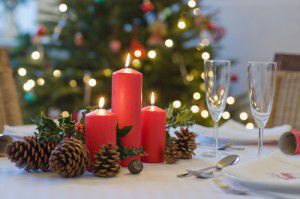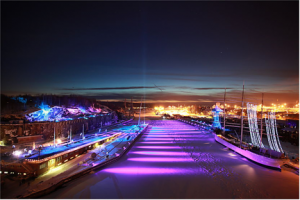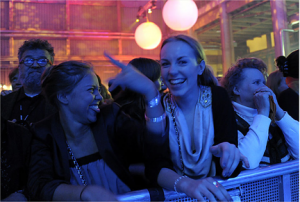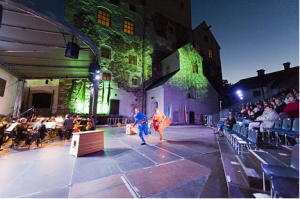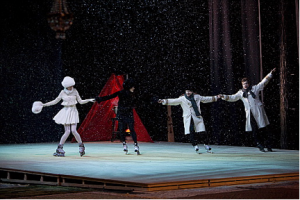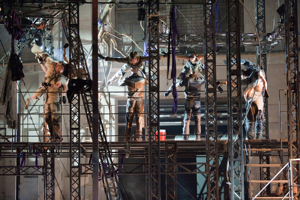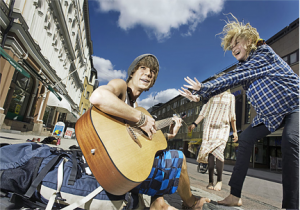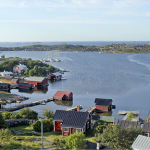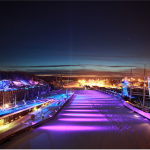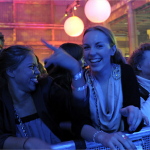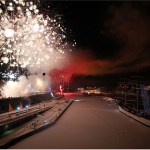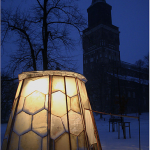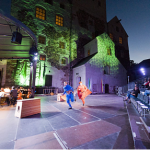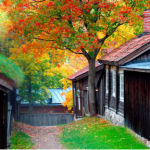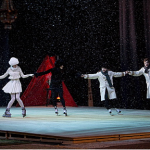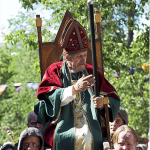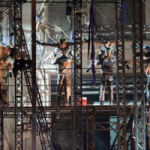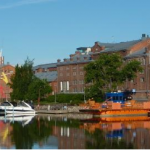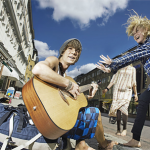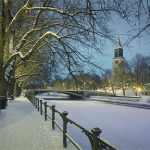Christmas celebrations!
Today is our last day in the office before the Christmas break. It seems like it’s crept up on us this year but now with just two days to go, we’re starting to look forward to our various celebrations. I asked a few people how they’ll be celebrating this year.
Lotta:
My mother is Finnish so we (my three siblings, partners, niece and nephew) have our Christmas meal and presents on Christmas Eve at her house, which is always beautifully decorated Scandinavian style (no tinsel!). That means Christmas Day is like Boxing Day where we just chill out, watch TV and have left overs.
On Boxing Day (26th December) I will cook at my house and have some of my husband’s cousins over, who are from Albania and don’t really celebrate Christmas, but like to get together – and will hopefully like my cooking!
Katie:
I go to my parents, who live up north, and because they live in the middle of nowhere, it’s a nice, quiet setting to celebrate. On Christmas Eve, I help prepare the veggies and set the table so all my Dad has to do is cook the dinner on the day! We exchange presents at midnight and on Christmas Day, we have dinner around 2pm before settling into playing some mahjong with the family.
Zsolt:
We usually buy a Christmas tree, then we spend about two hours in squeezing the Christmas tree into the previous year’s Christmas tree stand which is usually much smaller than the current one. After realising how many things we haven’t bought for the Christmas dinner, we start to decorate the tree and then get a surprise when we see that the cheap Christmas tree lights that we bought in the market for £0.99 don’t work.
When we have enough stress, we start cooking and feel happy because we have a lot of time until our guests arrive, then suddenly someone rings the door bell. Our uninvited guests enter the flat and start consuming half of the food we planned to serve for the dinner.
Hanna:
I’ll be celebrating in Finland by eating too much Christmas ham, going to a Christmas concert, and listening to the Declaration of Christmas Peace. I wanted to go skiing but there’s no snow 🙁
Sheila:
I am trying to make a Trinidadian rum cake for Christmas this year… this is the first time I’m trying to make it – it’s an old family recipe. When I was younger my Gran used to send one in the post every Christmas. Preparations started in August! Step 1 is soaking lots of fruit in rum and cherry brandy for a few months…
Peter:
In the Ukraine we celebrate Christmas on 7th January. Children go from house to house and when people answer the door the children throw a handful of grain then sing a song in exchange for sweets or money (sort of a combination of Halloween and carol singing).
We’d love to hear how you plan to celebrate the holiday. Have a lovely Christmas and New Year everyone. We’ll be back in 2012!
Liz
Turku – Europe’s Culture Capital 2011
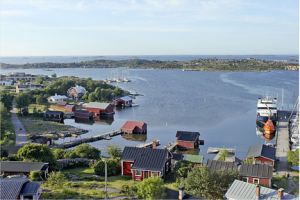
Kökär in the Turku archipelago, one of a series of settings for the Lights Concert Series, part of the Turku 2011 programme. Photo: Esko Keski-Oja
Since 1985, the Council of the European Union has annually chosen a European Capital of Culture, to “highlight the richness and diversity of European cultures”, and to “bring people from different European countries into contact with each other’s culture”. My Finnish hometown of Turku, nestled in the midst of the picturesque archipelago of some 10,000 islands in the Baltic Sea is, along with the beautiful medieval town of Tallinn in Estonia, the European Capital of Culture for 2011.
And what an exciting year it has already been for Turku. Commencing with a spectacular opening ceremony, involving flying dance troupes, hundreds of lantern-bearing school children and a 350-strong choir parading the cobbled streets of Finland’s oldest town, Turku’s 2011 cultural calendar has embraced thousands of individual events, performances and productions.
The individual events have ranged from the beautifully ethereal exhibition 876 Shades of Darkness, contemplating the long dark nights of the Finnish soul, to the alfresco performances of the Opera d’Alvilda in Abo, an Italian opera written in 1692, being performed in the grounds of the imposing Turku Castle.
Historically Turku has embraced culture in all its forms, whether it be through a vibrant music scene centred around two annual music festivals occupying the town centre and nearby island of Ruissalo, or the numerous art and archaeological museums and impressive number of amateur theatres (I counted 13).
This tradition of theatrical performance in Turku is embodied in the rather bulky 60s concrete façade of the much-loved municipal theatre. Offering productions of both homespun and international favourites, the theatre’s Anna Karenina has been extremely well received this year, earning accolades like the prestigious Thalia award for the 2011 Best Theatrical Performance.
Every summer, the spirits of the medieval possess the cobbled streets of Turku’s old town with the Medieval Market fair that habitually attracts around 100,000 visits over four days. Re-enacting everyday street life as as it might have been lived in the alleyways and squares of medieval Turku, this entertaining and informative fair arrives every year, complete with rope twisting competitions, fearful knights and mischievous jesters (see here for a photo album – click on the links on the left to view more pictures).
At the sympathetically restored and historic quayside, an old waterside factory now houses productions by the internationally acclaimed modern dance group Aurinkobaletti.
Next door, the prestigious (and always oversubscribed by aspiring undergraduates) Turku Academy of Art overlooks the symbolic heart of the city, the river Aura. The adjacent city ferry “Föri” takes passengers on a cultural voyage across the river: its distinctive yellow deck has acted as the setting for more than one art performance in the 90 seconds it takes to cross the river.
The 2011 European Capital of Culture award has stimulated Turku’s cultural heritage in new and novel ways, as the variety and sheer volume of productions and performances are acting to bring a new flavour, as well as a renewed vigour, to an already rich cultural landscape.
We must not forget that Turku and Tallinn will pass the mantle of the European Capital of Culture to the towns of Guimarães and Maribor in 2012, and all Turku residents would urge their fellow Europeans to embrace the fascinating cultures of these towns with the same enthusiasm and interest that have been visited upon Turku and Tallinn over the past year. The spirit of the occasion, and the genuine, absolute honour the locals express on being bestowed the award, will stay with Turku for a long time to come.
Hanna
- Kökär in the Turku arcipelago, one of a serios of settings for the Lights Concert Series, part of the Turku 2011 programme. Photo: Esko Keski-Oja
- The opening ceremony of the Turku’s Culture Capital year. Photo: Lauri Paasio
- Festive spirit at the opening celebrations. Photo: Lauri Paasio.
- The opening ceremony of the Turku’s Culture Capital year. Photo: Lauri Paasio
- 876 Shades of Darkness. Photo: Reino Koivula
- Opera d’Alvilda in Abo. Photo: Kari Vainio
- Luostarinmäen käsityöläismuseo / Luostarinmäki Handicrafts Museum. Photo: Johannes Lahti / Turun kaupunki
- Anna Karenina by Turun Kaupunginteatteri. Photo: Robert Seger
- Turku Medieval Market fair. Photo: Esko Keski-Oja
- Tanssiva torni – Dancing tower by Aurinkobaletti. Photo: Kari Vainio
- The town ferry ‘Föri’. Photo Markku Salo – Yle
- A Turku street busker visited by a fan. Photo: Perttu Saksa
- Turku Cathedral at dusk. Photo: Perttu Saksa
